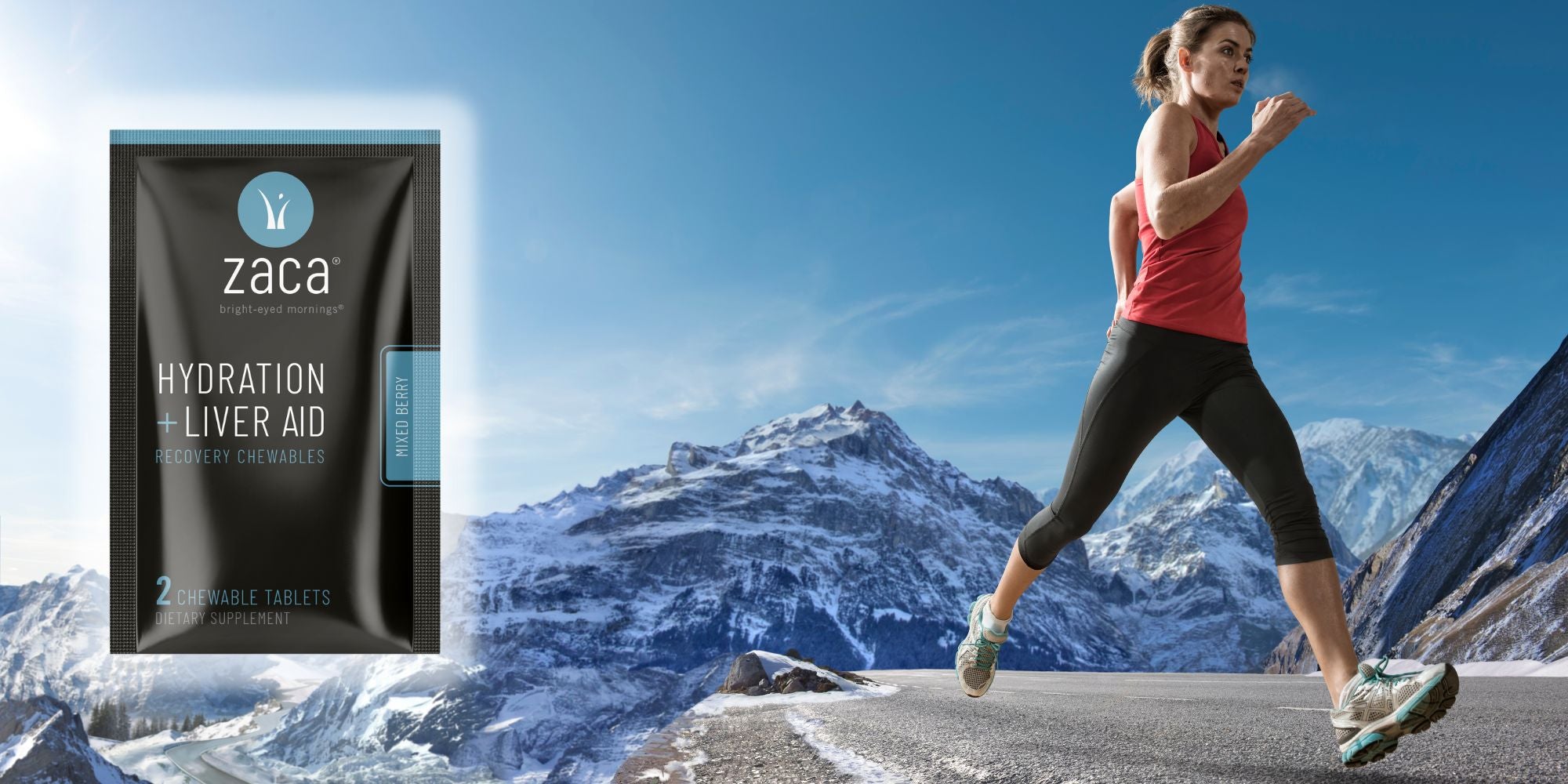
If you want helping in adjusting to high altitude running and improved performance, our Zaca chewables are a top-choice solution. We'll dive into how Zaca can help you adjusting to high altitude running.
As oxygen levels lower the higher you go in altitude, it gets harder to breathe. Lower oxygen levels take a toll on the body, cause oxidative stress, dehydration, and can decrease running performance.
Staying adjusted and hydrated by feeding your body the proper nutrients while you are on the run can be extremely helpful to high altitude running and performance. This is why we recommend Zaca chewables.
Zaca chewables are formulated with a blend of nutrients that not only help the body to rehydrate, but to combat the negative effects of altitude such as free radical damage. Making adjusting to high altitude running significant easier on your body.
Simply take 2 chewables before your high altitude run. Since they are easy, convenient and portable, you can take more as needed during longer distance running. If you're competing in a high altitude marathon or other high altitude sport, taking Zaca chewables days leading up to the competition will help your body adjust better.
Zaca chewables are a natural dietary supplement essential for hydration and performance in high altitudes. Also known as hydration chews for running, Zaca helps your body adjust by fueling it with altitude-friendly nutrients such as Glutathione, Glutamine and DHM.
This helps you perform better while running in the mountains or at higher elevations than you normally would be able to tolerate. It’s also great for mountain biking, hiking and any other activity where you need some extra help adjusting to higher elevation levels.
Zaca uses active ingredients that have been used for centuries in traditional medicine around the world. They work together to help rehydrate, replenish and recover: giving you more energy and allowing you to train harder.
Here's the high altitude running benefits of Zaca's ingredients:
With antioxidants, herbs and amino acids, Zaca chewables are a natural way to help your body during high altitude runs.
High altitude running can be a challenge for even the most experienced runners. But there are ways to help you adjust and acclimate to the new environment. Zaca’s three core herbs — Glutathione, Glutamine and DHM — have been used in traditional Chinese medicine for centuries or proven in modern science to help with high altitudes.
We’ve studied these ingredients and found that they may provide a unique combination of benefits for your body as it adjusts to altitude changes. Here's the science behind 3 key herbs for high altitude running:
These three key herbs for altitude adjustment should be supplemented for adjusting to high altitude running. Which is why at Zaca we made them conveniently available in our chewable tablets.
Elevation starting between 3000 and 5000 feet is considered high altitude running. The higher you go, the harder it is for your body to get enough oxygen from the air you breathe in. This makes running more difficult because your muscles and cells need more oxygen.
Consider that altitude sickness, or acute mountain sickness, typically starts at around 8000 feet. Elevations of this height can make high altitude running extremely hard if you're fighting off altitude sickness at the same time. Symptoms include headache, nausea, vomiting and fatigue — all of which can make it hard to run or even function normally.
In our home town of Denver Colorado, we often see visitors suffer from altitude sickness at 5280 feet high. If you're traveling from sea level for high altitude training, be best prepared for altitude sickness. For more help, read our guide How To Avoid Altitude Sickness.
At high altitude like in Colorado or Utah, your body has less oxygen to work with, and it's harder for your muscles and body to perform at their peak.
Luckily, there are several ways to make the most of your training while you’re in the mountains. Here are three tips to help you better prepare and adjust to high altitude running and training:

Zaca is a small, Colorado-based company that specializes in creating a high-quality supplement for athletes and altitude. This supplement is designed to help running and training, making it ideal for athletes to thrive at high altitudes. It contains a proprietary blend of ingredients that work together in high altitudes to help you run better, train harder and recover faster by increasing your endurance, antioxidants and performance. Try Zaca's chewable supplement today to feel better and stronger running at high altitudes.
SOURCES:
1. Glutamine as an Anti-Fatigue Amino Acid in Sports Nutrition
https://pubmed.ncbi.nlm.nih.gov/30999561/
2. How L-Alanyl L-Glutamine Improves Endurance Performance
https://firstendurance.com/how-l-alanyl-l-glutamine-improves-endurance-performance/
3. Compound Summary l-Alanyl-l-glutamine
https://pubchem.ncbi.nlm.nih.gov/compound/l-Alanyl-l-glutamine
4. Better performance for improved hydration
https://www.nutraceuticalbusinessreview.com/news/article_page/Better_performance_for_improved_hydration/142369
5. Examination of the efficacy of acute L-alanyl-L-glutamine ingestion during hydration stress in endurance exercise
https://www.ncbi.nlm.nih.gov/pmc/articles/PMC2851582/
6. Effect of high altitude (7,620 m) exposure on glutathione
https://pubmed.ncbi.nlm.nih.gov/11320641/
7. The Possible Importance of Glutamine Supplementation to Mood and Cognition in Hypoxia from High Altitude
https://www.ncbi.nlm.nih.gov/pmc/articles/PMC7760805/
8. Dihydromyricetin Improves Physical Performance under Simulated High Altitude
https://journals.lww.com/acsm-msse/fulltext/2014/11000/Dihydromyricetin_Improves_Physical_Performance.6.aspx
Copy the coupon code & use it at checkout